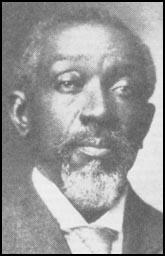Isaiah Montgomery

Isaiah Montgomery was born a slave at Hurricane, a large plantation on the Mississippi River on 21st May, 1847. He was the property of Joseph Davis, elder brother of Jefferson Davis. His father, Benjamin Montgomery, was the plantation's business manager. This enabled Isaiah to get a good education.
At the age of sixteen Montgomery was employed as a cabin boy by Admiral David D. Porter. He was also with General Ulysses S. Grant when in 1863 he captured Vicksburg and freed the Mississippi from the control of the Confederate Army.
After the American Civil War Montgomery returned to Hurricane and with his father reopened their store as Montgomery & Sons.
With the help of his former master, Joseph Davis, they vied with northern officials of the Freedmen's Bureau for control of Hurricane. This eventually resulted in having Samuel Thomas, head of the bureau in Mississippi, being removed from office.
In 1866 Joseph Davis sold the plantation at Davis Bend to Benjamin Montgomery and his sons. They turned this into a cooperative community of freed slaves. In 1872 Isaiah Montgomery took full control of Hurricane, the largest cotton plantation at Davis Bend. The village of Mound Bayou was established and Montgomery became mayor.
Although Montgomery had good management skills, the price of cotton, problems with floods and insects, and worsening political conditions, meant that the venture was not an economic success and he was forced to sell off some of the land to Major George W. McGinnis, manager of the land office of the new Memphis-to-Vicksburg Railroad.
As mayor of Mound Bayou, Montgomery advocated the educational theories that had been promoted by his friend, Booker T. Washington. This included technical training and teaching the latest methods of scientific agriculture. Girls were taught homemaking skills so they could provide better care for their families.
Montgomery, a supporter of the Temperance Movement, imposed a ban on the sale of alcoholic beverage. He believed this was a major factor in keeping the crime rate low in Mound Bayou. In the first 20 years of its existence only three persons were sent to the mayor's court to the white circuit court for trail. Two of these offences were committed by strangers to the village.
Montgomery lost the support of many Civil Rights leaders when in 1890 he became the only black delegate at the Constitutional Convention in Mississippi by consenting to a scheme to guarantee white supremacy by disfranchising black voters. He justified the "striking down the rights and liberties of 123,000 freemen" by the argument that he was trying to bridge the "chasm (between the races) that has been widening and deepening for a generation... that threatens destruction to you and yours, while it promises no enduring prosperity to me and mine."
In 1900 Montgomery joined with Booker T. Washington in Boston to form the National Negro Business League. At the next meeting held in Chicago Montgomery gave a talk on "The Founding of a Negro City".
In 1902 Montgomery accepted a federal appointment as receiver of public moneys for Mississippi. However, the following year a special agent from New Orleans and after ransacking his office, claimed he found evidence that Montgomery had been depositing "moneys of a semi-official character in an unauthorized bank". The agent's racism is revealed in the following passage from his report when he argued that if Montgomery was not sacked it "would result in an attack on the administration for shielding and whitewashing a ******."
Montgomery was indeed forced to resign but when President Theodore Roosevelt made a public gesture concerning his achievements by making a special trip to Mound Bayou.
Isaiah Montgomery lived prosperously until his death on 6th March, 1924.
